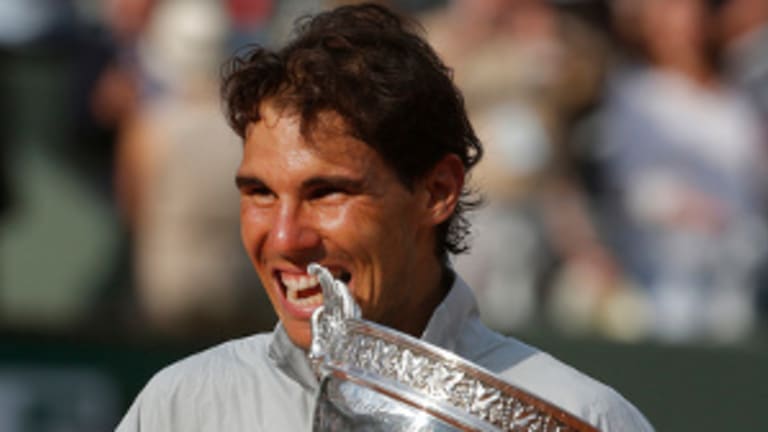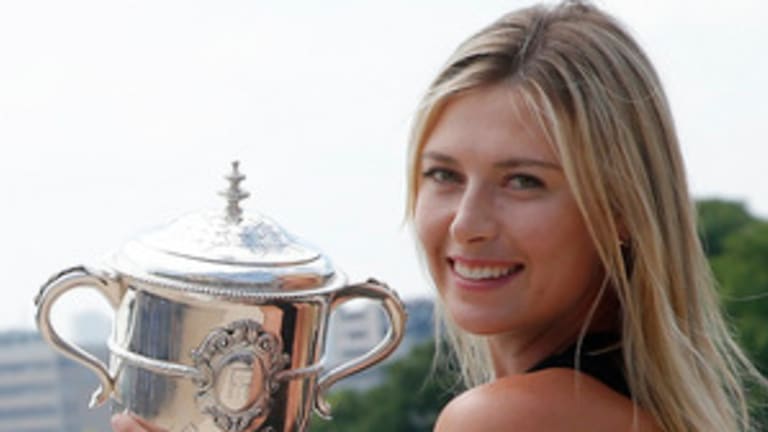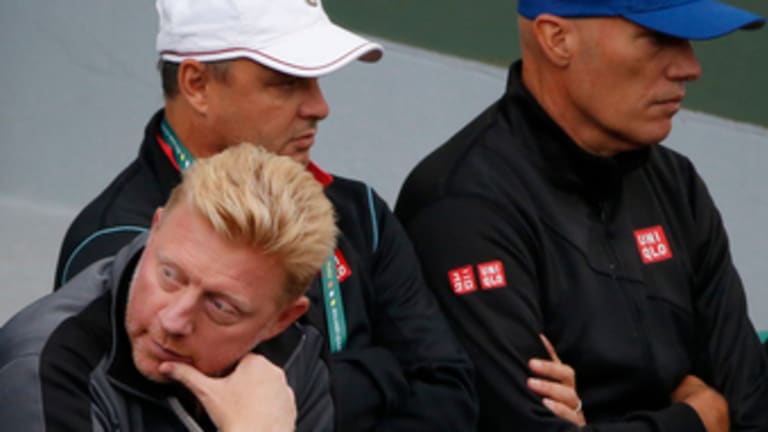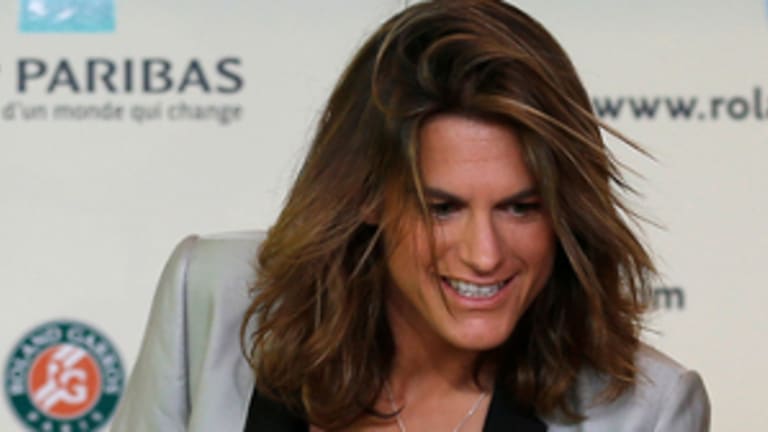Today we bid adieu to a French Open that jolted us with surprise over the first week, especially on the women’s side, but which ended with two familiar faces holding the winner’s trophies. After a slow start to 2014, the Persistents—i.e. Maria Sharapova and Rafael Nadal—showed that they still pay off.
Persistents Pay Off
By Steve Tignor Jun 09, 2014Style Points
Aryna Sabalenka’s Australian Open outfit is a stylish nod to Serena Williams and Sharapova
By Stephanie Livaudais Jan 08, 20262025 Best Viral Moments
The Internet couldn’t stop talking about Serena Williams in 2025
By TENNIS.com Dec 03, 2025Social
Maria Sharapova goes from the Hall of Fame to the practice court
By Ed McGrogan Oct 06, 2025Lifestyle
Luka Doncic buys Maria Sharapova's $25 million mansion
By Baseline Staff Sep 14, 2025Tennis Channel at the US Open
Kim Clijsters picks Jannik Sinner, Naomi Osaka to win 2025 US Open titles
By David Kane Aug 25, 2025Tennis Channel at the US Open
Tennis celebrates Maria Sharapova's Hall of Fame induction, Serena Williams leads the cheers
By Stephanie Livaudais Aug 24, 2025International Tennis Hall Of Fame
Maria Sharapova, brothers Bob and Mike Bryan inducted into International Tennis Hall of Fame
By Associated Press Aug 24, 2025International Tennis Hall Of Fame
"Surprise!" Serena Williams introduces Maria Sharapova at International Tennis Hall of Fame induction ceremony
By Ed McGrogan Aug 23, 2025Your Game
Four lessons you can learn from Maria Sharapova
By Joel Drucker Aug 21, 2025Persistents Pay Off
Who made the grade, and who came up short, at the French Open?
Published Jun 09, 2014
Advertising
Rafa turned 28 at this year’s French Open, and this may have been his canniest, savviest, most veteran victory in Paris. As he said afterward, he had struggled with his confidence after his loss at the Australian Open, but he had started to feel the motivation again a month or so ago—"my mentality was there again, no?” is how he put it. Nadal played better in Madrid, and better still in Rome, but he saved fifth gear for his quarterfinal win over David Ferrer and his semifinal win over Andy Murray in Paris, two of his most thorough and convincing victories of the season. By now, peaking for the final at Roland Garros is a matter of instinct for Nadal.
When Rafa reached the final, even though he didn’t have his best to start, he knew exactly when he needed to find it: “Without that second set, I don’t know if I have this trophy with me now,” he said afterward.
It’s one thing to know when to turn it on, though, and another thing to do it. Nadal found his forehand in the middle of the second set, and swung the match in his direction just in time. And when he suffered a rare bout of exhaustion and nerves while trying to close it out at 4-2 in the fourth, he knew that disaster wasn’t inevitable, if he could just hang on a little longer.
What gave him that belief? You can find the key in the words he said right after the match: “Today the tennis gave me back what happened in Australia.”

Persistents Pay Off
© AP
Advertising
Nadal hasn’t won Roland Garros nine times because he’s the most confident player in the tournament’s history—he's the first to tell us that he isn't. But he is realistic, and when it comes to tennis, he believes in a sort of cosmic justice. Last year, after his five-set win over Djokovic in the semifinals, he said that, essentially, it was only fair that he would get to win a marathon over Nole, after Nole had won one over him in Australia in 2012. This time, he believed it was only fair that he would survive a physically grueling major final, after a back injury had kept him from competing seriously in his last one, in Melbourne.
Nadal doesn’t believe he’s going to win every match, even at the French Open. He believes, instead, that losses will follow wins and that—even when things are looking their worst—wins will follow losses, and can even be inspired by losses.
That’s the kind of sensible confidence any tennis player can use. But only Rafa could be realistic enough to do something totally un-realistic like winning nine titles at Roland Garros in 10 years. A+
To me, this was the finest and most characteristic performance of her career, precisely because it wasn’t. In her past Grand Slam title runs, Sharpova has tended to steamroll the competition for the better part of two weeks. This time she did anything but—this title was precarious and nerve-wracking from the opening games of the second week all the way to the end.

Persistents Pay Off
© AP
Advertising
Stosur, Muguruza, Bouchard, and Halep: Each of them outplayed Sharapova for long stretches, each of them came within at least two games of beating her, and each of them ended up watching her run away with the match. When Serena Williams loses on clay, Sharapova is almost always there to capitalize. This time, Serena’s defeat appeared to be a double-edged sword for her: The more determined Maria became to win the title—the word hellbent comes to mind—the more constrained her game became.
At no time was that more true than in the final. There Sharapova had to recover from one of the most stunning collapses I’ve seen from a champion of her reputation. Up 5-3 in the second-set tiebreaker, two points from what seemed to be an inevitable fifth major title, she lost four straight points, each one uglier than the last.
But Sharapova forgot them all—if her shoulder isn’t great for serving, it certainly helps her shrug things off. In shrugging off a double fault that made it 4-4 in the third, and winning the last eight points of the match, Sharapova imposed the one thing she has over every other woman (except one): her resolve. You’re probably tired of hearing that “Maria is a fighter,” but it’s not an insult to repeat it. No player reveals the truth at the heart of tennis—that’s it’s a game of will above all else—the way she does. A+
I hope she was the discovery of the tournament for many. No one combines as much athleticism and elegance into one efficient package. What could be simpler than to move the ball around the court, smack a winner, and walk straight back to get the balls for the next point? What could be harder?
Halep’s French Open was a breakthrough, both in the way she won and the way she lost. She had never been past the quarters at a Grand Slam; now that barrier is broken. She had obviously never played a Slam final, and that barrier is broken as well. It was a learning experience, but you get the feeling, after she came back from a set down and pushed Sharapova, a Hall of Famer, to the limit, that Halep doesn’t have a lot left to learn. A
Two Slams in 2014, two semis for the 20-year-old. She had her chances for more against Sharapova, but she showed just the slightest hesitation down the stretch in that match. For the most part, though, the best thing about Genie is that even when she attacks and misses, she’s not afraid to go right back on the attack again. A-
To me, it's always been more fun to listen to her talk than to watch her play, but her bulldoze job of Sara Errani was a shotmaker’s dream. Her enthusiast's personality would be a nice addition to the top of the game—kind of like Ernests Gulbis', but in reverse. A-
The 20-year-old Spaniard gave us the shock of the tournament, and probably the year, with her 6-2, 6-2 win over Serena. And while she couldn’t quite overcome Sharapova in the quarters, she wasn’t the only one. Her wallops are fun to watch. A-
From my perspective, this had to be as disappointing as a loss can get for Djokovic. He hired Boris Becker to help him in these moments, but he came up short, physically and psychologically, to Rafa at Roland Garros again. It was Djokovic’s fifth straight loss in a major final outside of Australia; worse, it came after he had beaten Nadal four straight times.

Persistents Pay Off
© AP
Advertising
If I were Becker, or Marian Vajda, or someone else in his camp, I would try to do nothing more than to get Djokovic to compete clearly, steadily, and on something close to an even keel for the duration of one of these big finals. On Sunday he played well early, but when Rafa made a run in the second set, Djokovic quickly despaired, and his body and game slumped—he slammed a racquet, and spent much of the fourth set chattering to himself. Novak obviously had physical issues, too, but his attitude was more negative, for a longer stretch of time, than I would have expected in this, the biggest match of his season. Granted, he was playing Nadal at Roland Garros, but he’s beaten Rafa nearly 20 times in his career.
Only when he was down 2-4 in the fourth, with his back to the wall and Rafa struggling physically, did Djokovic appear fully composed and in a competitive groove again. He wasn’t hanging his head, but he also wasn’t just trying to fire off immediate winners, the way he can in those situations. He was competing with a clear head. It didn’t win him the fourth set, but I’m willing to bet it would have won him a fifth. B+
To say Gulbis was due for a deep Slam run may be the understatement of the tennis season—he had been due, due, and due again. But at 25 he made it happen, beating Roger Federer and reaching the semifinals. I didn’t like the way Gulbis finished; the moment it appeared possible that he could take Djokovic to a fifth set in the semis, he disappeared. But now, at least, he has shown that he can overcome his weaknesses. As for his off-court activities, while his views on women may be retrograde, his press-conference talk is fun for the rest of us to talk about. B+

Persistents Pay Off
© AP
Advertising
He played one of his best clay-court matches against Fernando Verdasco, and hung in heroically under trying circumstances against Philipp Kohlschreiber and Gael Monfils. Then, against Nadal, he came out flatter than a pancake that had just been run over by a truck. The semis is a solid result for a man about to defend his Wimbledon title. And kudos to him for hiring a woman, Amelie Mauresmo, to be his coach there. B+
Slowly, steadily, just a little monotonously, a future is arriving on the men’s tour. B+
We knew she had shots; now we know she has potential. B+
There are few sights in tennis finer than seeing La Monf in full, winning flow at the French Open. There are few sights more exasperating than seeing him roll over and give in at the same place. B
His time on court caught up with him again in the end, but the Big American had a career-best showing in Paris. B
She was playing well enough to win the tournament, until the moment when it seemed possible that she could actually win the tournament. Then she didn’t win another game. B-
There’s choking, and then there’s losing 12 straight points when you’re up 4-1 in the third in the quarterfinals of the French Open. B-
This time a fourth-round finish didn’t feel like the mark of a “big match” player. Which probably had something to do with the fact that, when she got there, Sloane was outclassed by Halep, a woman she had beaten 1 and 1 at a major last year. B-
She went out in the first round on a very tough day, but she handled her press conference afterward with straightforward dignity, and even a little humor. B-
As he shifts to grass, his early-season momentum has dissipated, and his struggles serving out sets are still with him. So let's emphasize the shifting-to-grass part. C+
Is it possible for her to ask draw makers to keep her out of Lucie Safarova's way in the future? That alone might be worth a month of practice. Now Ana has to start all over in getting our hopes up again. C
Yes, she’s still No. 1. Yes, she lost to a good young player. And no, she can't win them all. But in three of the last four Grand Slams, Serena has gone out before the quarterfinals. This time she struggled even to challenge a 20-year-old ranked outside the Top 30. Will that 20-year-old’s game plan—hit deep and down the middle—become a template for others? C-
He's Stan, not Stanislas now. The question is: When we will be able to call him Stanimal again? C-